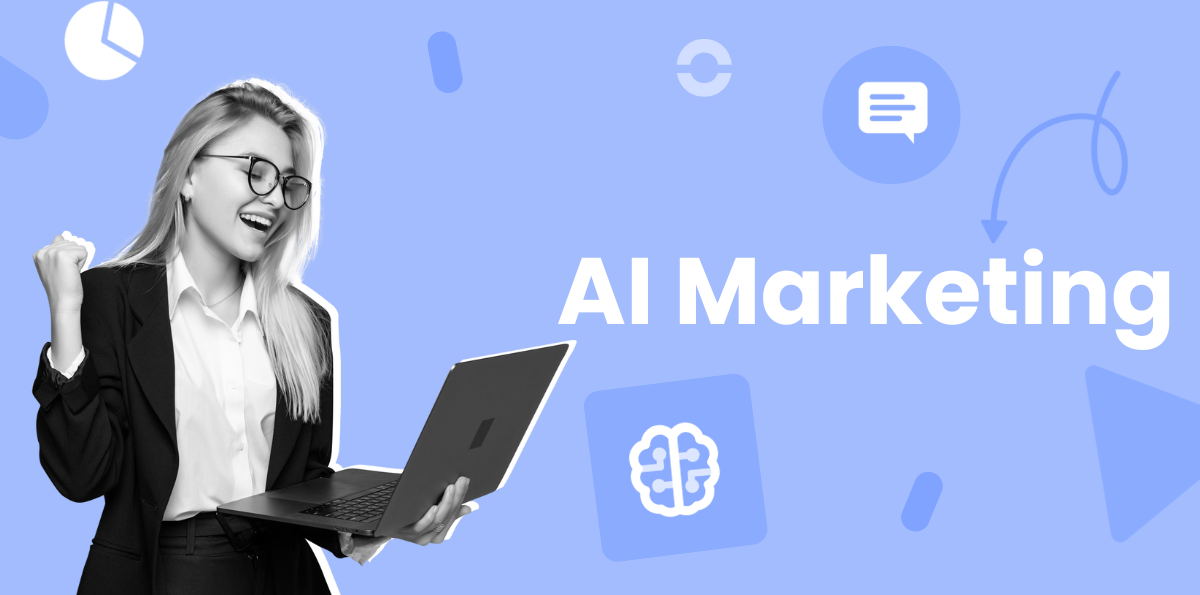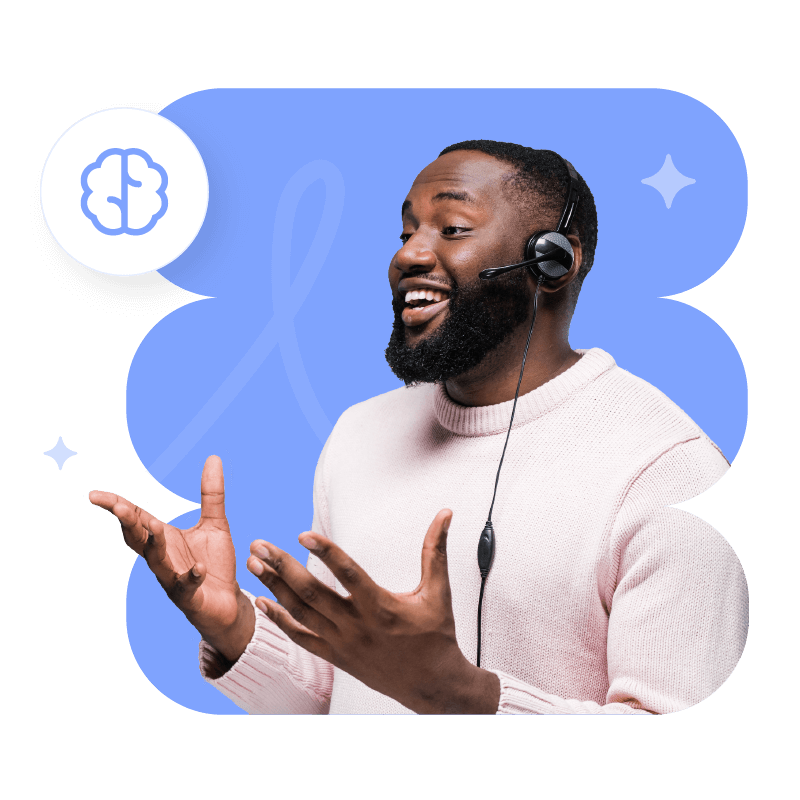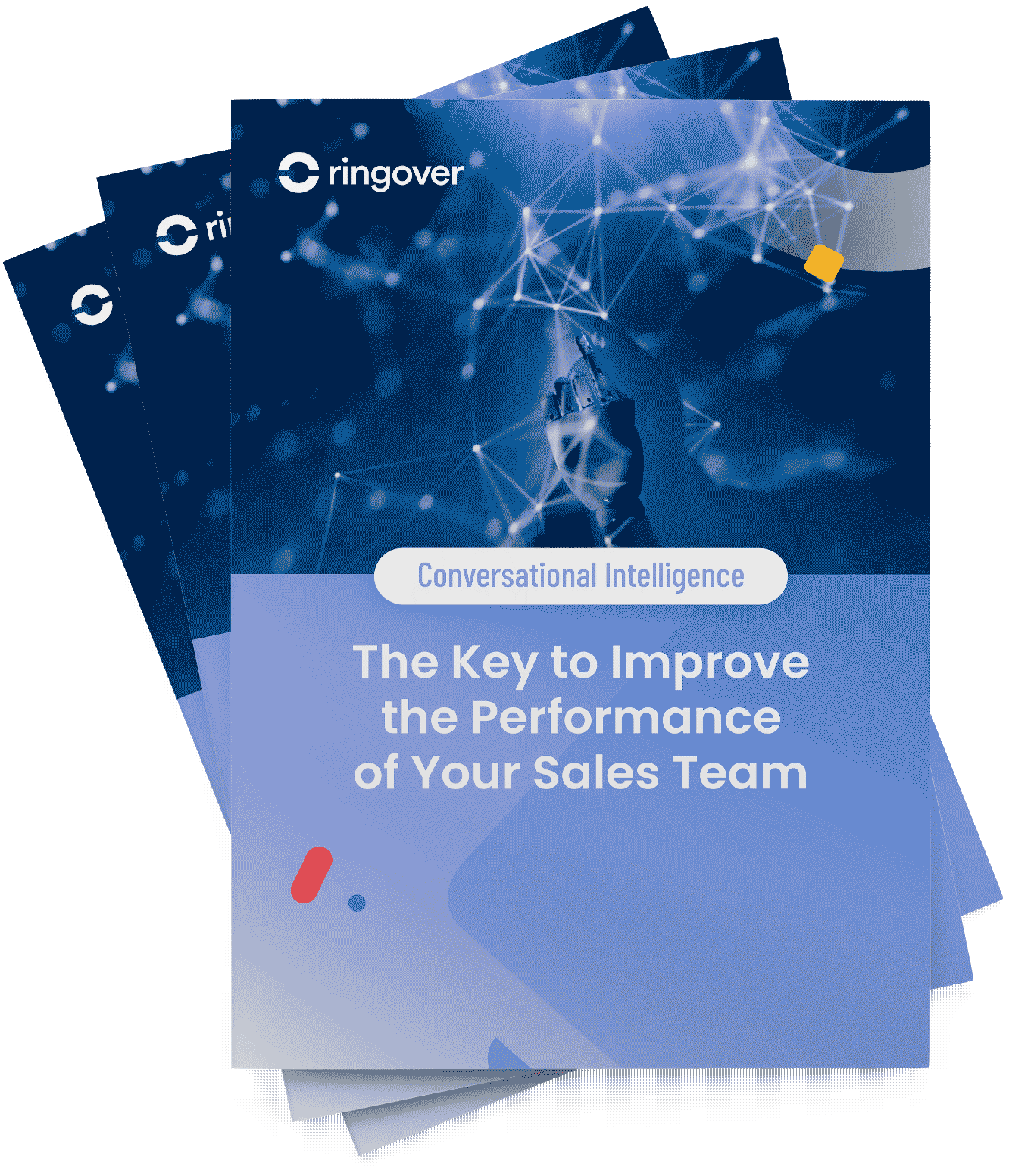Summary
Employing machine learning, natural language processing (NLP), and predictive analytics, AI marketing tools automate mundane tasks, offer insightful recommendations, and elevate the consumer experience. These tools are tailor-made for various objectives, from refining content creation and customizing email campaigns to enhancing the efficiency of social media management.
Discover Empower by RingoverComparison table: 21 Best AI Marketing Tools
| Software Name | Software Purpose | Top Features |
|---|---|---|
| Empower by Ringover | A conversation intelligence solution that analyzes customer interactions to improve sales and customer service | Automatic call transcription, call summary, topic detection, CRM integration, real-time analytics |
| HubSpot | Comprehensive inbound marketing and sales platform powered by AI | Lead generation, CRM integration, AI-driven email marketing |
| Mailchimp | AI-powered email marketing and automation tool for businesses of all sizes | Predictive analytics, Audience segmentation, Smart recommendations |
| Hootsuite Insights | AI-based social media management platform for scheduling and analytics | Social media monitoring, Automated reporting, Content curation |
| Google Ads | AI-driven advertising platform to optimize PPC campaigns | Smart bidding, Automated ad creation, Audience targeting |
| Conversica | AI-powered sales assistant that engages leads and customers through automated email and SMS | Lead engagement, Follow-up automation, Conversation analytics |
| Acrolinx | AI-driven content creation platform that ensures brand alignment and quality | Content scoring, Brand voice consistency, Style guide enforcement |
| MarketMuse | AI-powered content research and optimization tool for marketers | Content optimization, Keyword research, Topic suggestions |
| Crimson Hexagon | AI-based consumer insights platform for social media and market research | Sentiment analysis, Audience segmentation, Trend monitoring |
| Lumen5 | AI-powered video creation tool for turning blog posts into engaging videos | Automated video creation, Content repurposing, Branding customization |
| PathFactory | AI-driven content intelligence platform that guides buyers through personalized content journeys | Content engagement tracking, Personalized recommendations, Buyer intent analysis |
| Salesloft | Conversational marketing platform that uses AI to engage website visitors in real-time | Chatbots, Conversational AI, Lead qualification |
| Seventh Sense | AI-based email delivery optimization tool for sales and marketing teams | Email send-time optimization, Audience engagement tracking, Integration with CRM |
| Adext AI | AI-driven ad optimization tool for managing and scaling digital ad campaigns | Automated campaign management, Cross-platform advertising, Budget optimization |
| BrightEdge | AI-powered SEO platform that optimizes content for search engines | Content performance tracking, Keyword recommendations, Competitive analysis |
| Phrasee | AI-driven copywriting tool for optimizing email subject lines, social media ads, and more | Natural language generation, A/B testing, Brand language optimization |
| Persado | AI-powered platform for generating marketing language that resonates with audiences | Emotionally targeted messaging, Personalized content, Multichannel delivery |
| FunnelAI | AI-driven customer engagement platform that helps brands identify and engage potential customers | Lead scoring, Predictive analytics, Intent data |
| Albert.ai | Autonomous AI-driven platform that optimizes digital marketing campaigns | Automated campaign management, Audience segmentation, Cross-channel advertising |
| Synthesia | AI-powered platform for creating personalized video content at scale | Video personalization, Custom avatars, Multilingual support |
| VEED | AI-supported video editing | Drag-and-drop editing, add music to your video |
For marketers, adopting AI means quicker decision-making, sharper targeting, and a noticeable boost in marketing ROI. These tools possess the capability to process and analyze extensive customer data swiftly, providing critical insights for formulating more effective marketing strategies.
AI is revolutionizing digital marketing across the board, from creating SEO-friendly content to streamlining lead engagement and social media scheduling. We'll explore the top 21 AI marketing tools, their applications in marketing, and the future implications, including the advantages and challenges of integrating these technologies.
List: Top 21 AI for Marketing Tools
1. Empower by Ringover
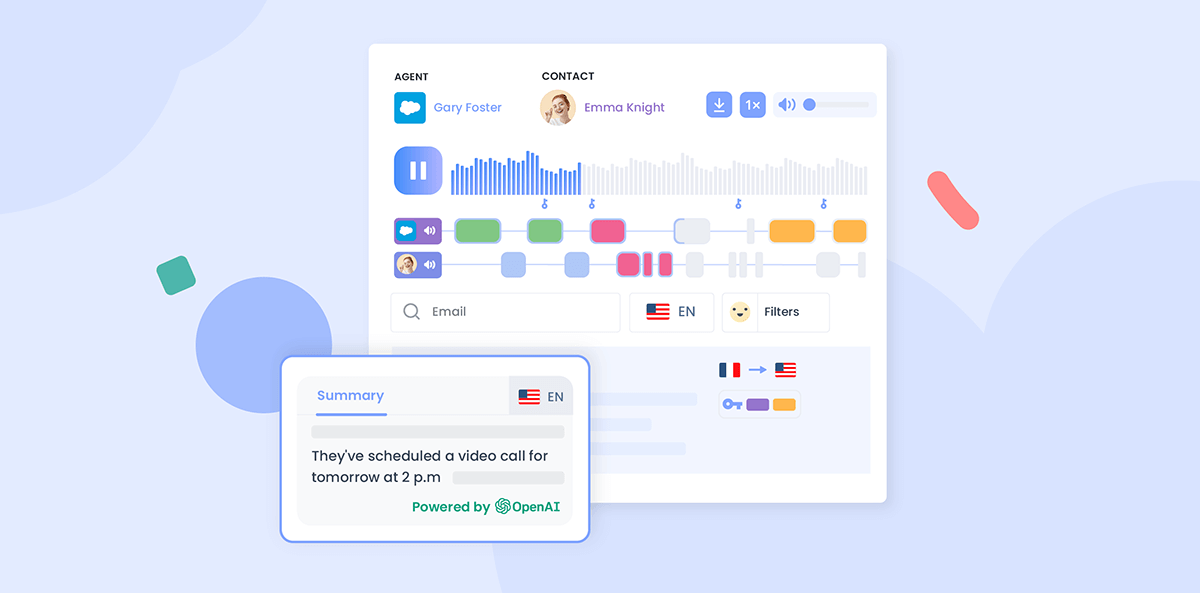
Empower by Ringover is an AI-driven conversation intelligence software designed to enhance marketing team efficiency. It simplifies and analyzes communication with clients so you can identify best practices and areas of improvement. The advanced analytics and insights to improve team interactions and optimize communication strategies.
Advantages✅
- Transcribes calls and uses sentiment analysis to identify and track emotions.
- Offers automated call summaries, topic identification, integrations with popular software like Hubspot, Pipedrive, Zoho, and the business phone system Ringover.
- Enhances team collaboration with actionable insights.
Disadvantages❌
- Requires integration with existing communication platforms.
2. HubSpot
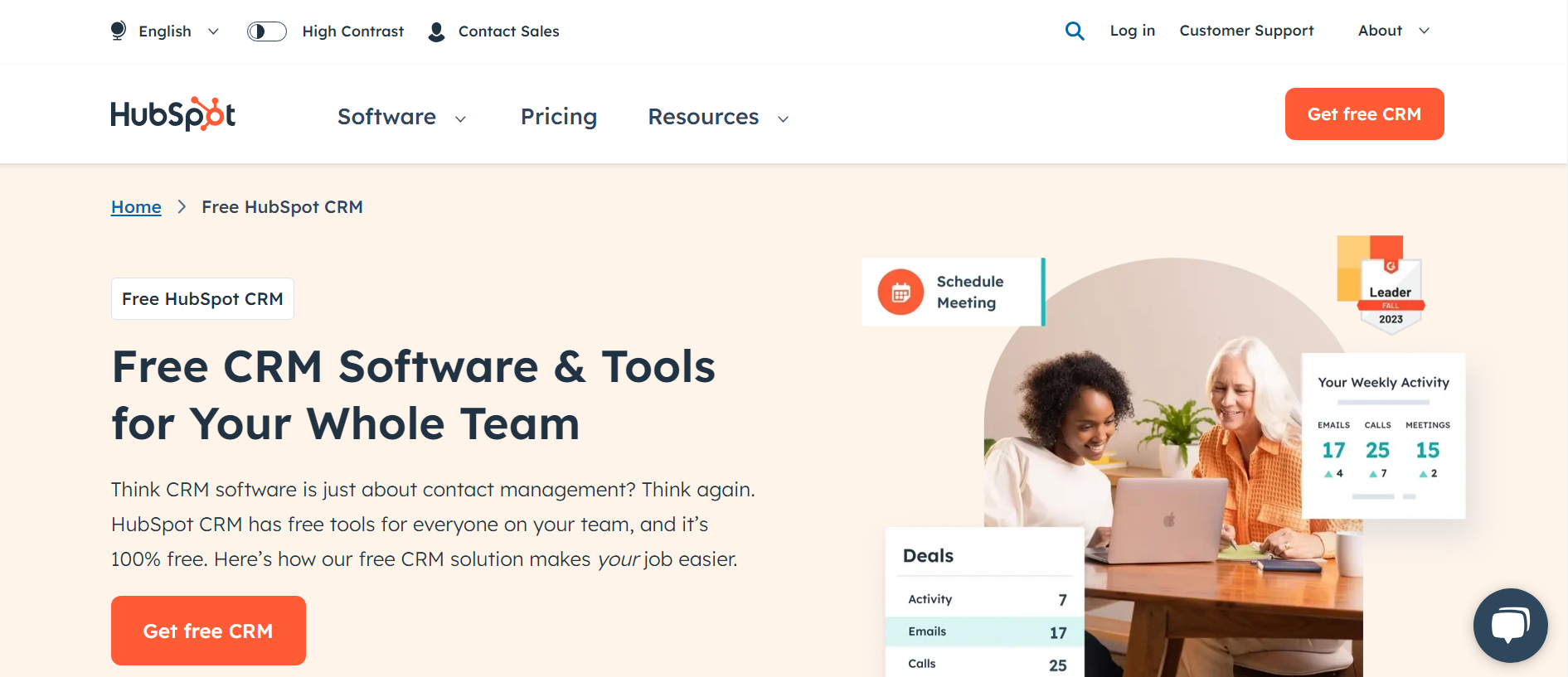
HubSpot is a comprehensive inbound marketing and sales platform that leverages an AI lead generation platform, customer relationship management (CRM), and marketing.
Advantages✅
- Integrates seamlessly with CRM for personalized marketing.
- AI-driven email marketing enhances customer engagement.
- Robust lead generation tools.
Disadvantages❌
- Can be expensive for small businesses.
- Complexity in setting up advanced features.
- Requires time to learn and fully utilize all features.
3. Mailchimp
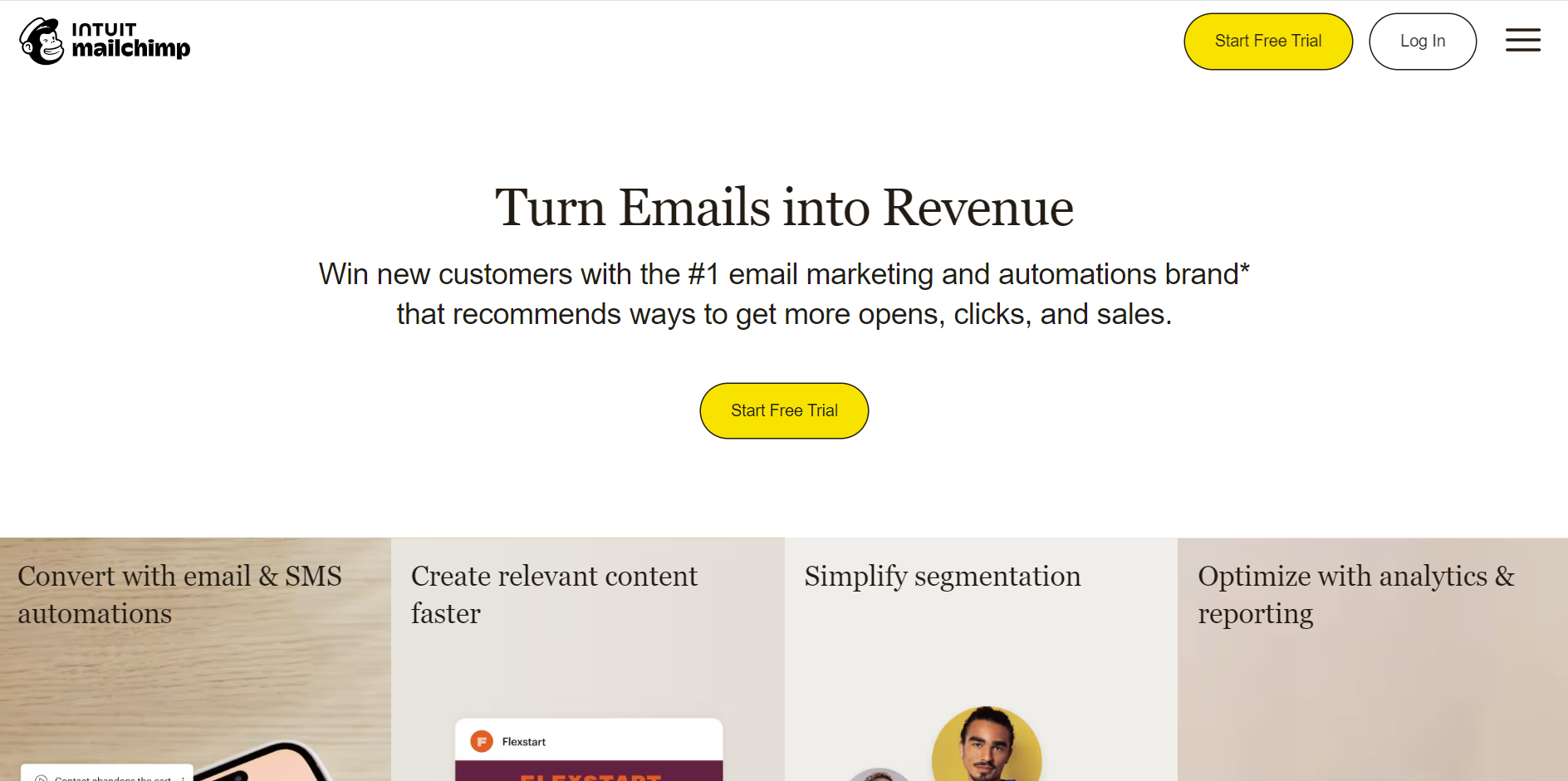
Mailchimp is an AI-powered email marketing and automation tool that helps businesses create targeted campaigns, segment audiences, and analyze performance.
Advantages✅
- AI-driven predictive analytics improve campaign performance.
- Advanced audience segmentation.
- Smart recommendations for optimizing email content.
Disadvantages❌
- Limited customization in lower-tier plans.
- May be overwhelming for beginners.
- Higher-tier plans can be costly.
4. Hootsuite Insights
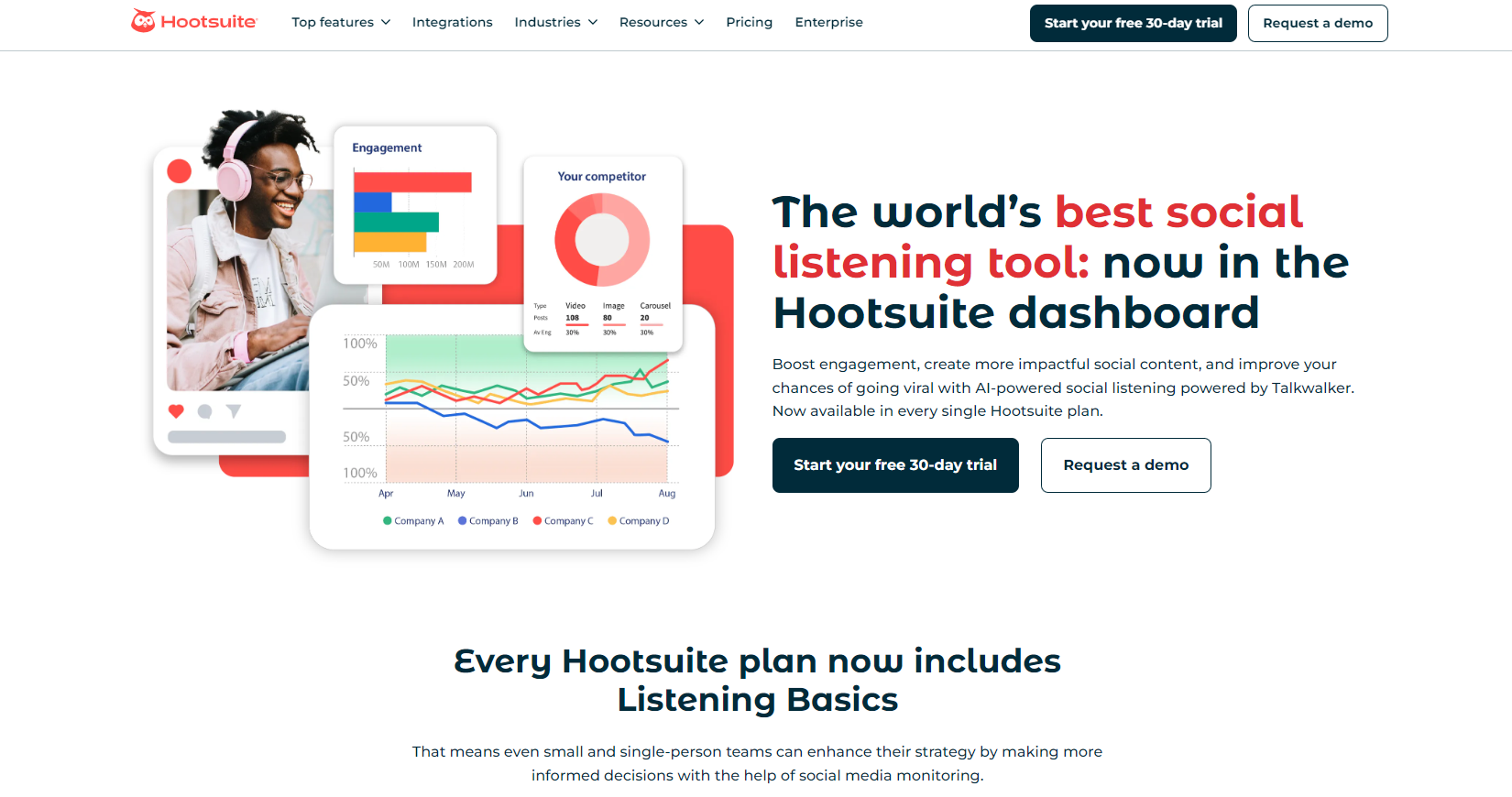
Hootsuite Insights is an AI-based social media management platform that allows marketers to schedule posts, monitor social channels, and analyze performance.
Advantages✅
- Comprehensive social media monitoring.
- Automated reporting saves time.
- Content curation features help discover relevant content.
Disadvantages❌
- Limited analytics in the basic plan.
- Can be expensive for small teams.
- Integration with certain social networks can be tricky.
5. Google Ads
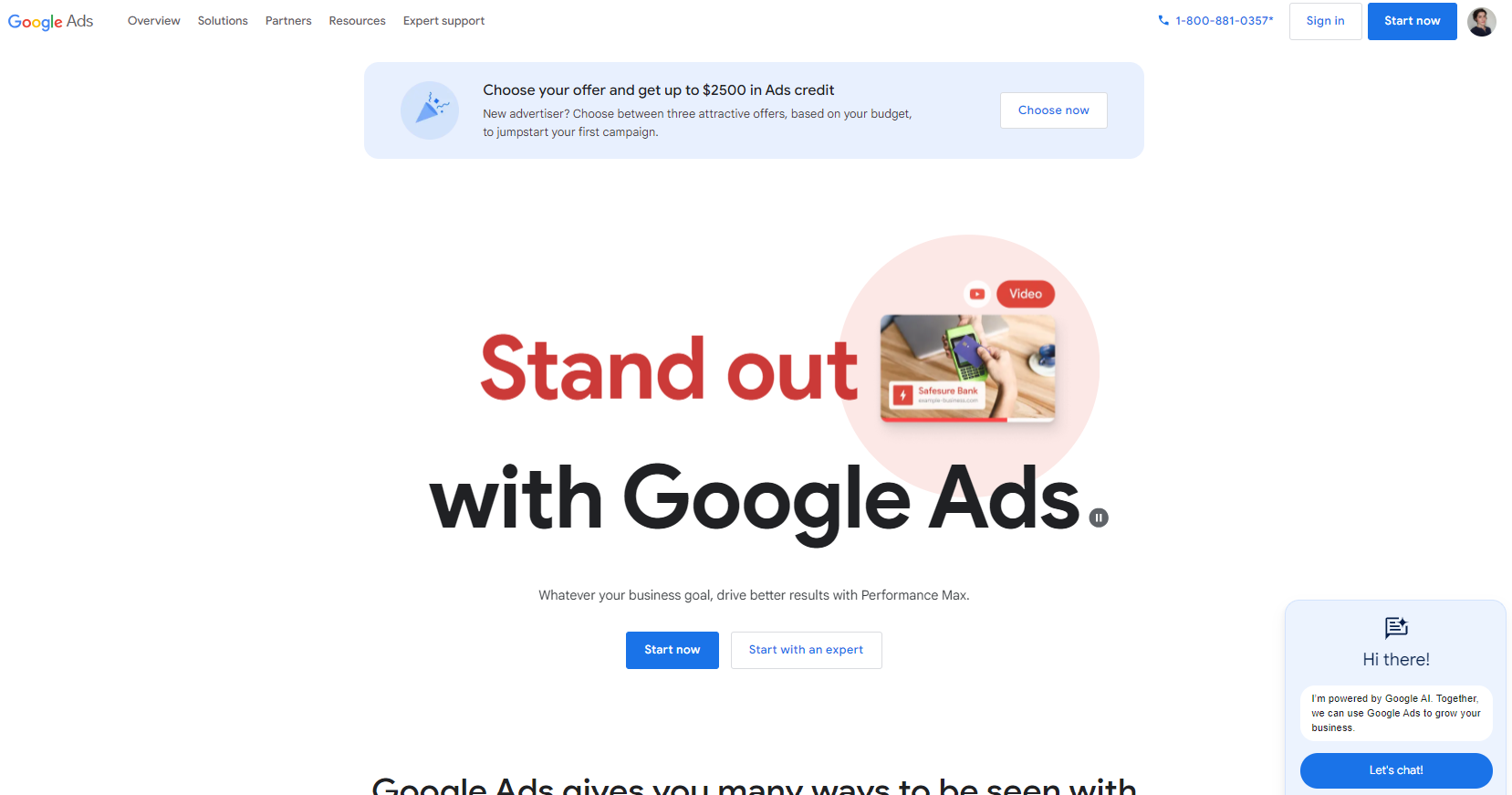
Google Ads is an AI-driven advertising platform that optimizes pay-per-click (PPC) campaigns by automating bidding strategies, ad creation, and audience targeting.
Advantages✅
- Smart bidding improves ad performance.
- Automated ad creation saves time.
- Precise audience targeting.
Disadvantages❌
- Highly competitive, leading to expensive clicks.
- Requires continuous monitoring to avoid overspending.
- Can be complex for beginners.
6. Conversica
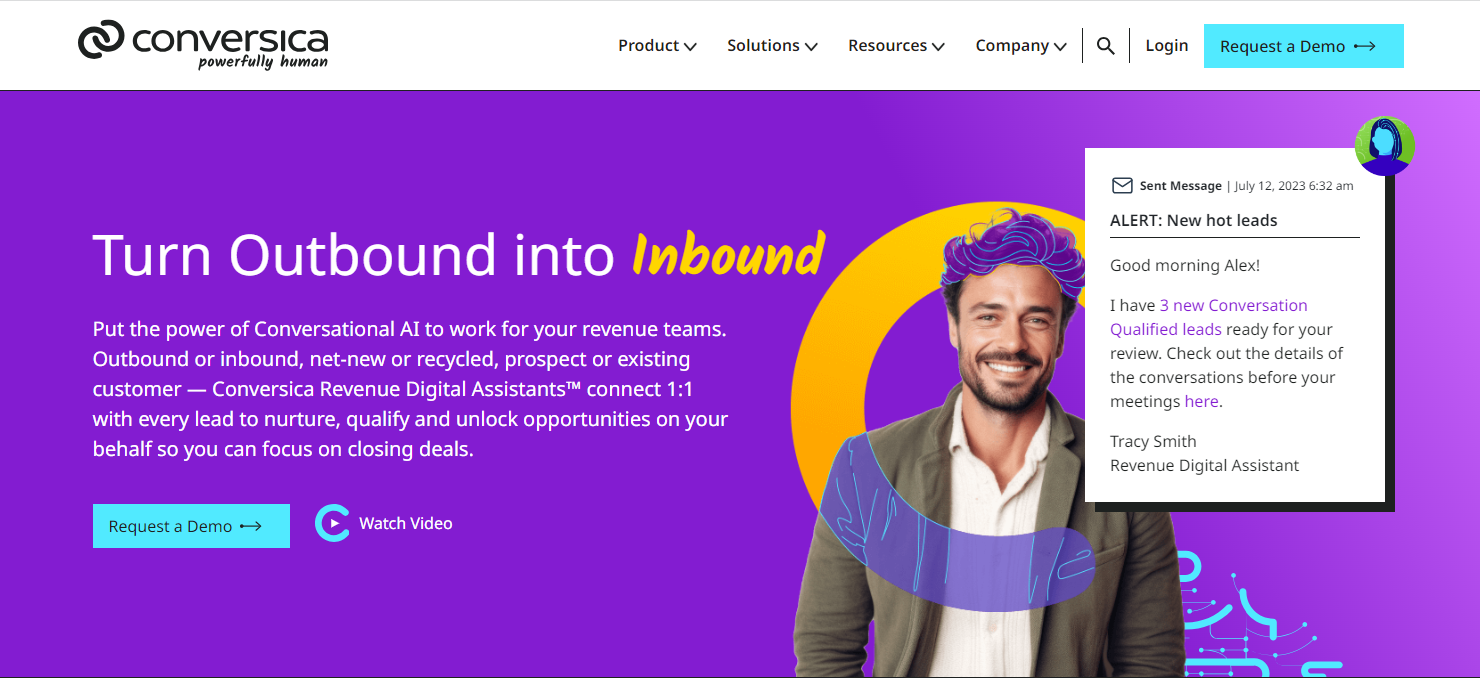
Conversica is an AI-powered sales assistant that engages leads and customers through automated email and text message conversations, helping to nurture relationships and move prospects down the funnel.
Advantages✅
- Automates lead follow-up, freeing up sales teams.
- Provides detailed conversation analytics.
- Increases lead engagement with personalized interactions.
Disadvantages❌
- Limited to email and SMS communication.
- Expensive for smaller businesses.
- May require customization for industry-specific needs.
7. Acrolinx
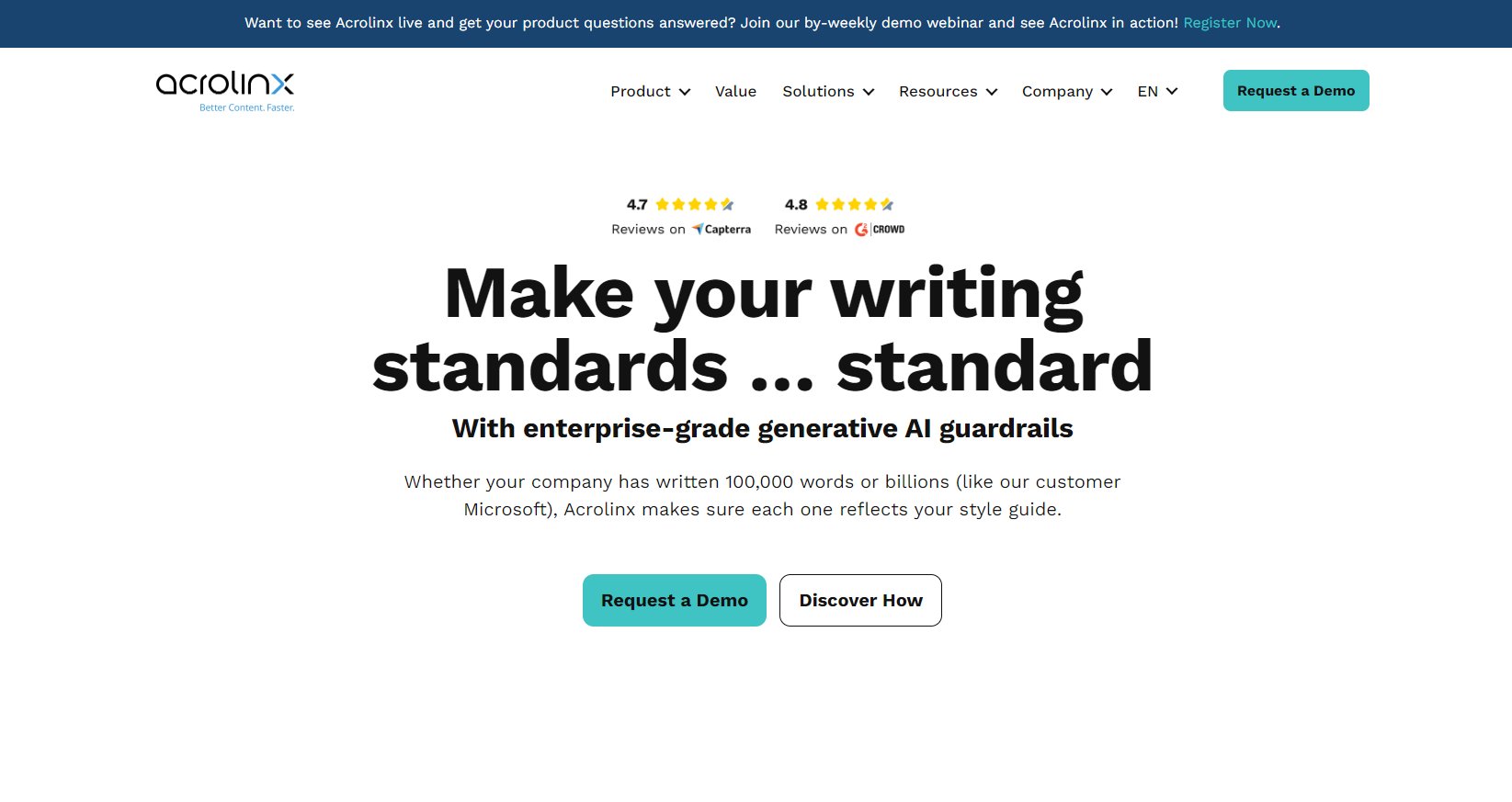
Acrolinx is an AI-driven content creation platform that helps companies maintain brand consistency and quality across all content by analyzing and scoring it against predefined guidelines.
Advantages✅
- Ensures brand voice consistency.
- Automated content scoring improves quality.
- Enforces style guide compliance.
Disadvantages❌
- High cost, especially for small businesses.
- Requires setup and configuration to match brand guidelines.
- Limited to text-based content.
8. MarketMuse
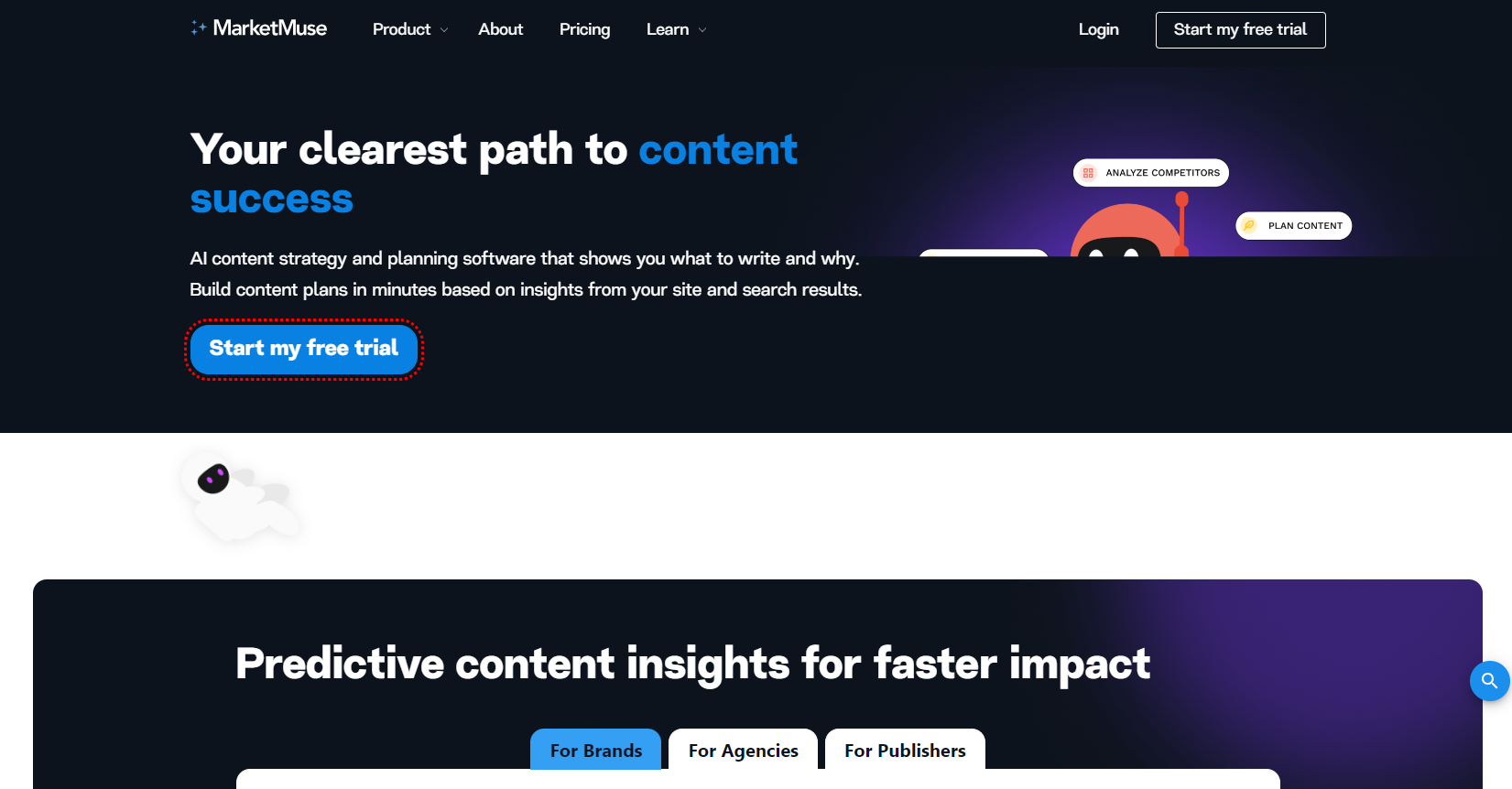
MarketMuse is an AI-powered content research and optimization tool that helps marketers create high-quality, SEO-friendly content by providing keyword insights and topic suggestions.
Advantages✅
- Enhances content optimization for SEO.
- Provides data-driven topic suggestions.
- Improves content strategy with competitive analysis.
Disadvantages❌
- Can be costly for smaller teams.
- Requires a learning curve to fully utilize features.
- Limited to content creation and SEO optimization.
9. Brandwatch
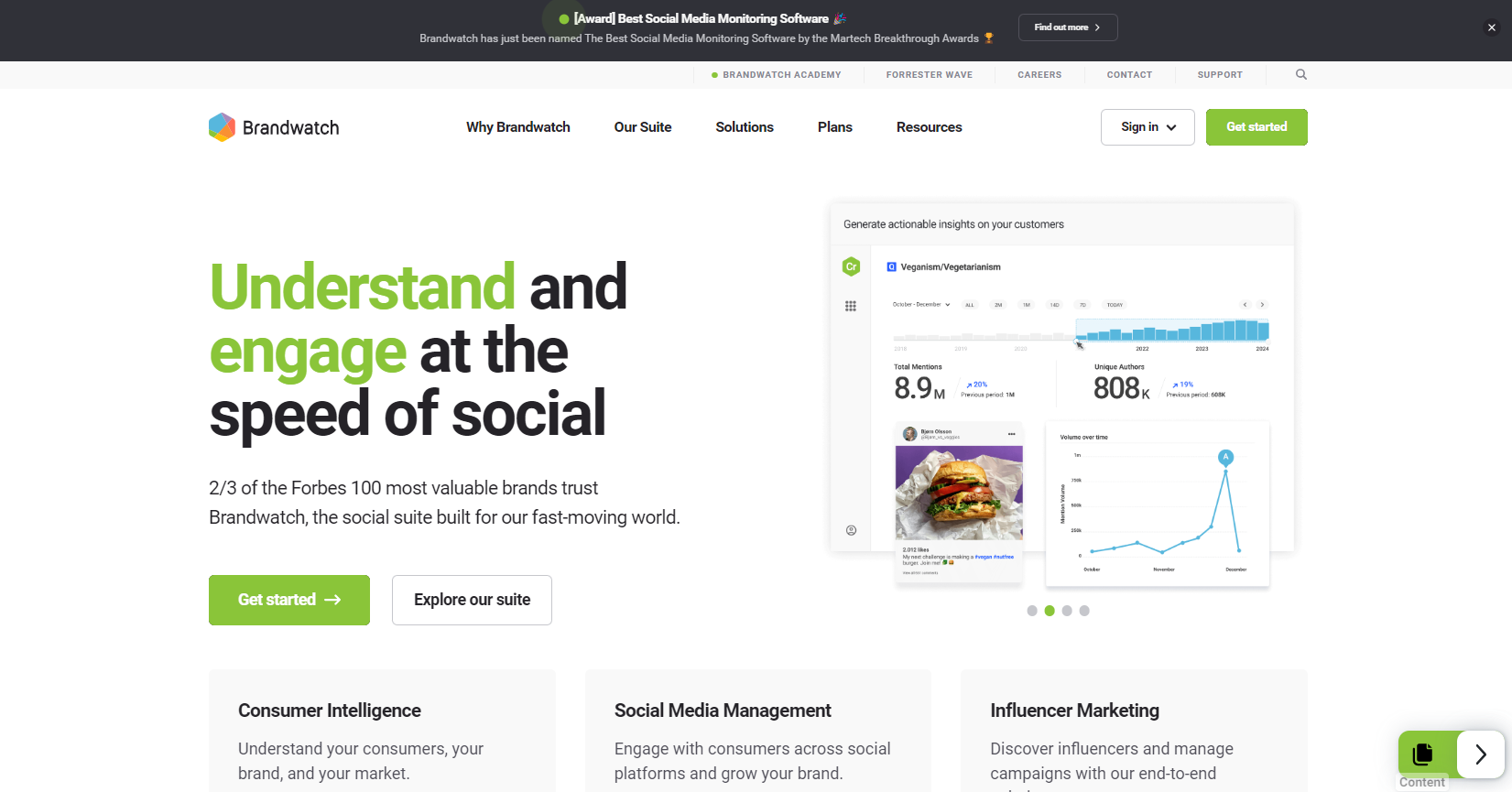
Brandwatch is an AI-based consumer insights platform that analyzes social media and other online content to provide businesses with deep audience insights and trend monitoring.
Advantages✅
- Powerful sentiment analysis.
- Detailed audience segmentation.
- Trend monitoring helps stay ahead of the competition.
Disadvantages❌
- High cost, suitable for larger enterprises.
- Requires training to interpret insights effectively.
- May not cover all social platforms equally.
10. Lumen5
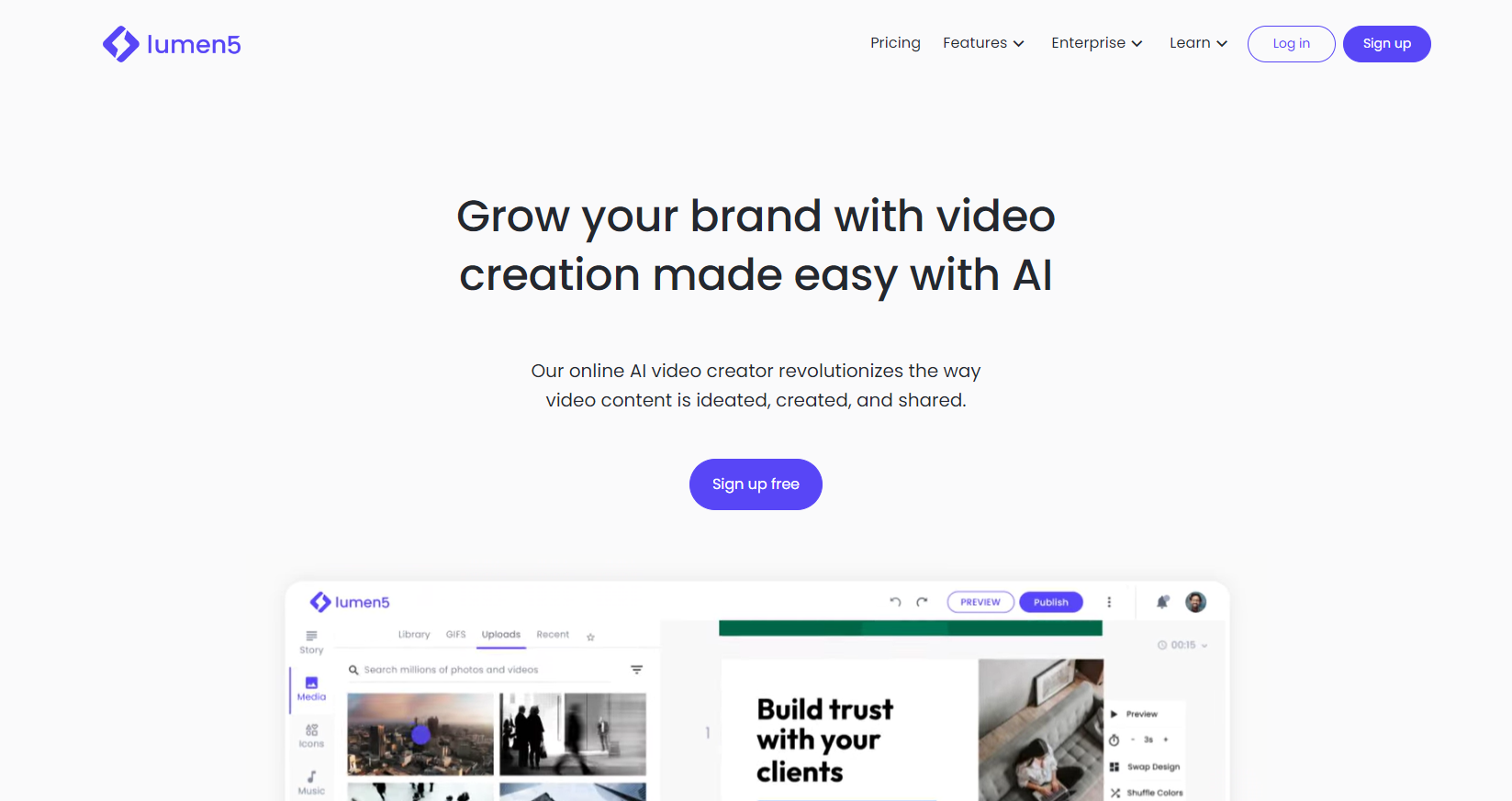
Lumen5 is an AI-powered video creation tool that turns blog posts and other content into engaging videos, making it easy for marketers to repurpose existing content.
Advantages✅
- Automated video creation saves time.
- Easy content repurposing for various platforms.
- Customizable branding options.
Disadvantages❌
- Limited video editing features.
- Subscription cost may be high for casual users.
- Video quality might not meet professional standards.
11. PathFactory
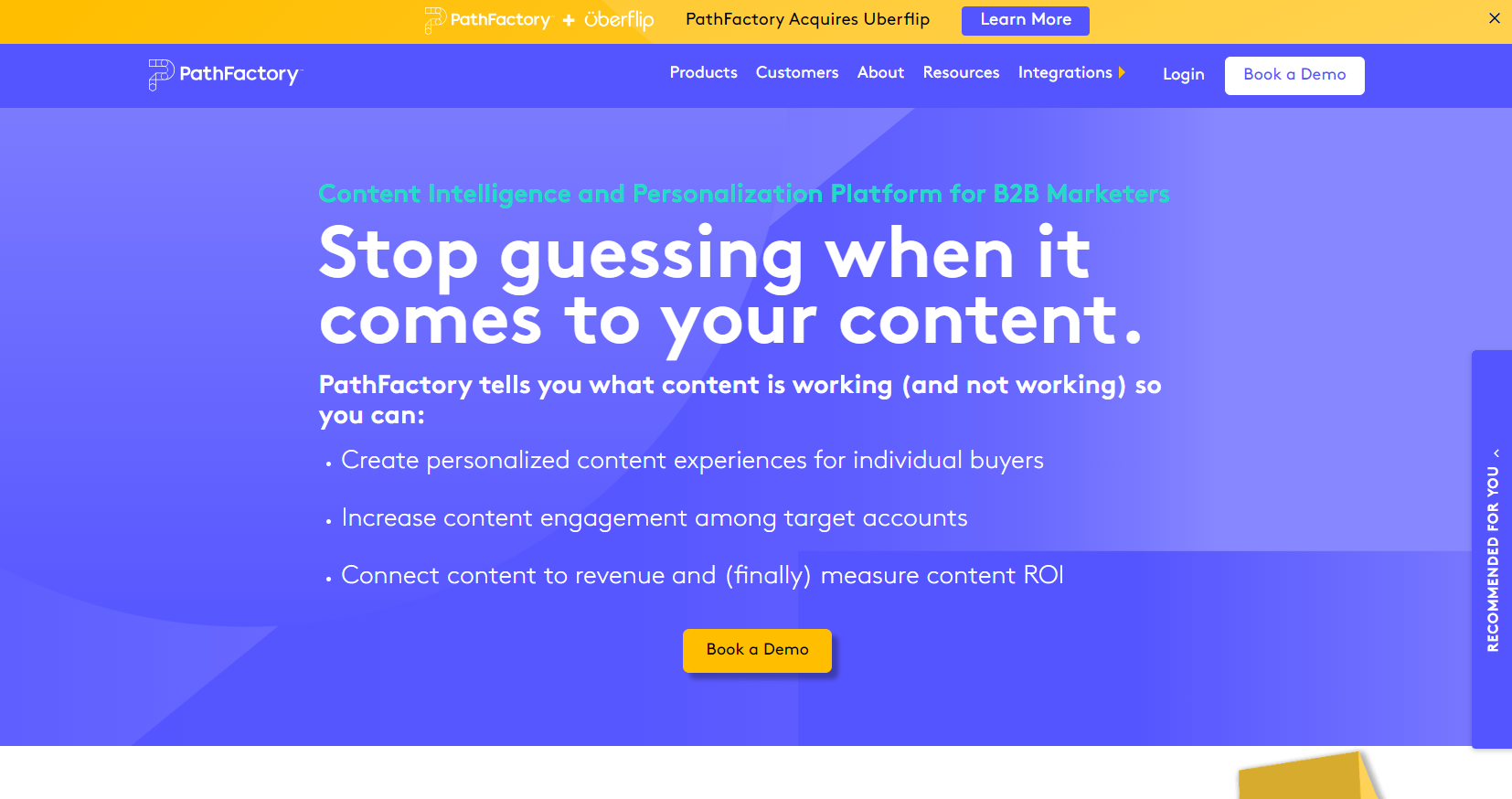
PathFactory is an AI-driven content intelligence platform that helps marketers guide buyers through personalized content journeys, increasing engagement and driving conversions.
Advantages✅
- Tracks content engagement in real-time.
- Offers personalized content recommendations.
- Analyzes buyer intent for better targeting.
Disadvantages❌
- High pricing model.
- Integration with other platforms may be complex.
- Requires time to set up personalized content journeys.
12. Salesloft
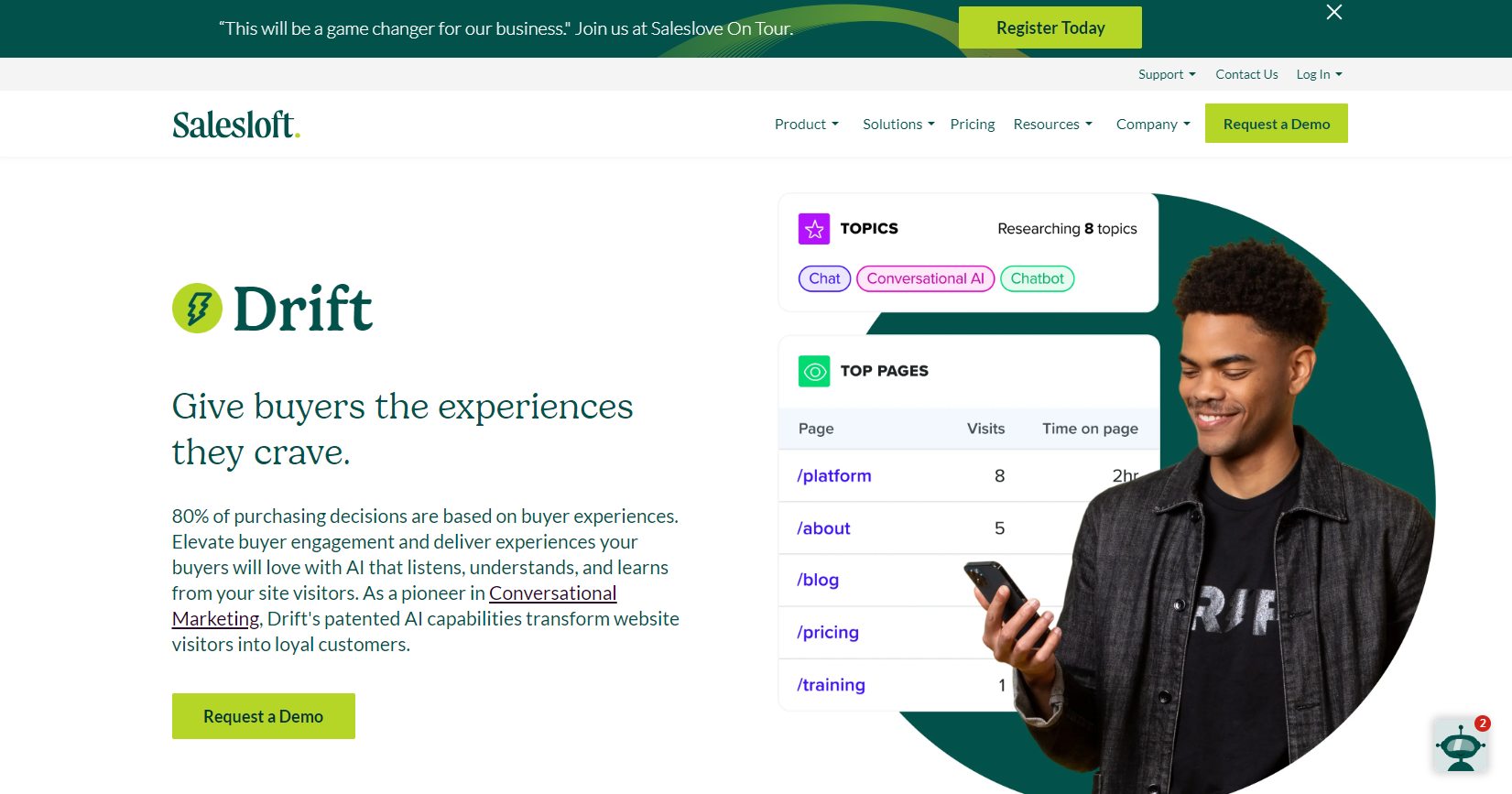
Salesloft, via its acquisition Drift, is a conversational marketing platform that uses AI to engage website visitors in real-time through chatbots, helping to qualify leads and drive conversions.
Advantages✅
- Real-time engagement with website visitors.
- AI-powered chatbots improve lead qualification.
- Seamless integration with CRM systems.
Disadvantages❌
- Can be expensive for small businesses.
- Requires setup and maintenance.
- May need fine-tuning to avoid irrelevant conversations.
13. Seventh Sense
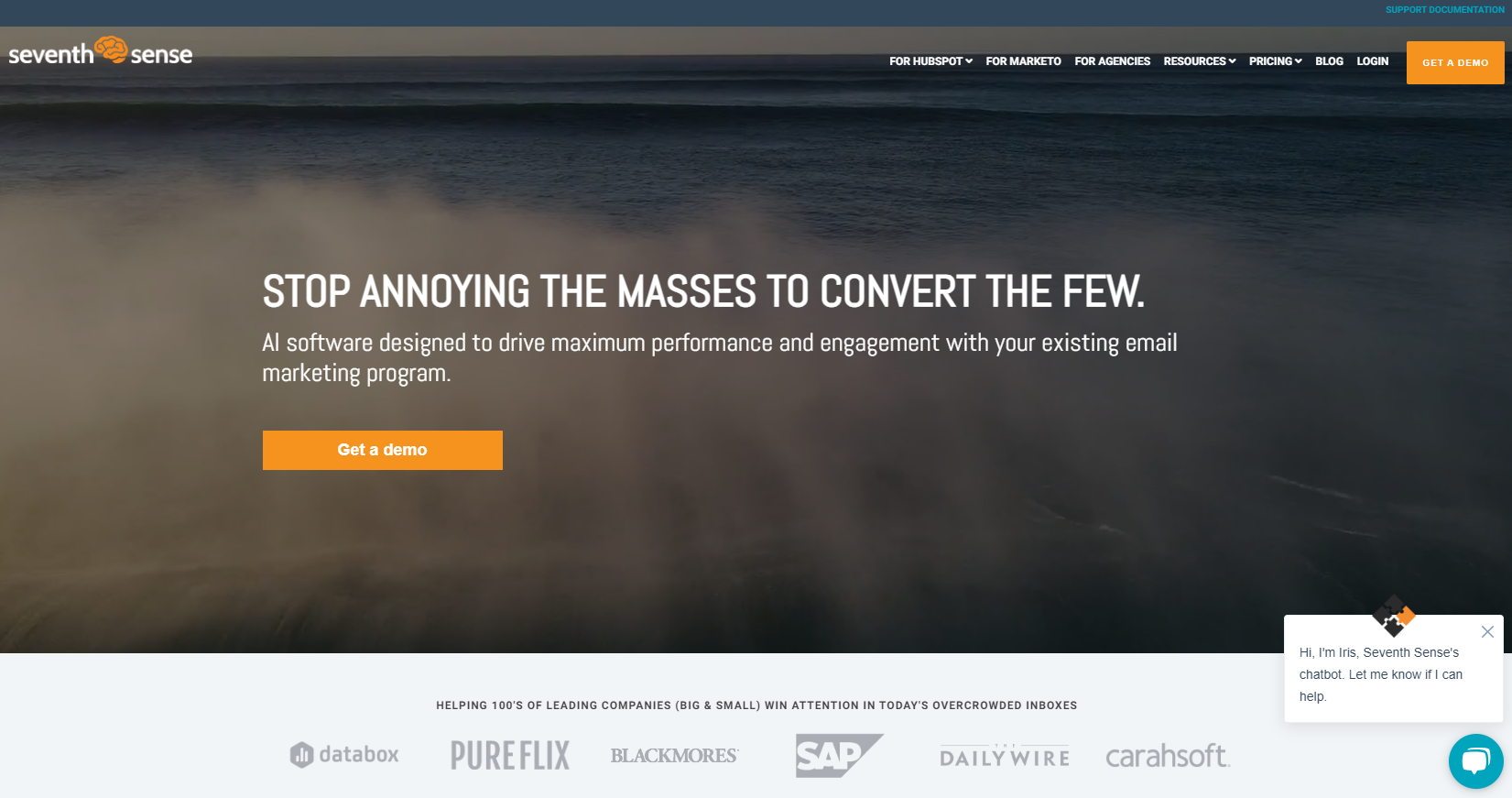
Seventh Sense is an AI-based email delivery optimization tool that analyzes audience engagement to determine the best times to send emails, increasing open rates and conversions.
Advantages✅
- Optimizes email delivery times for maximum impact.
- Tracks audience engagement for better targeting.
- Integrates with popular CRM platforms.
Disadvantages❌
- Limited to email optimization.
- Subscription cost can be high for small teams.
- Requires integration with existing email platforms.
14. Adext AI
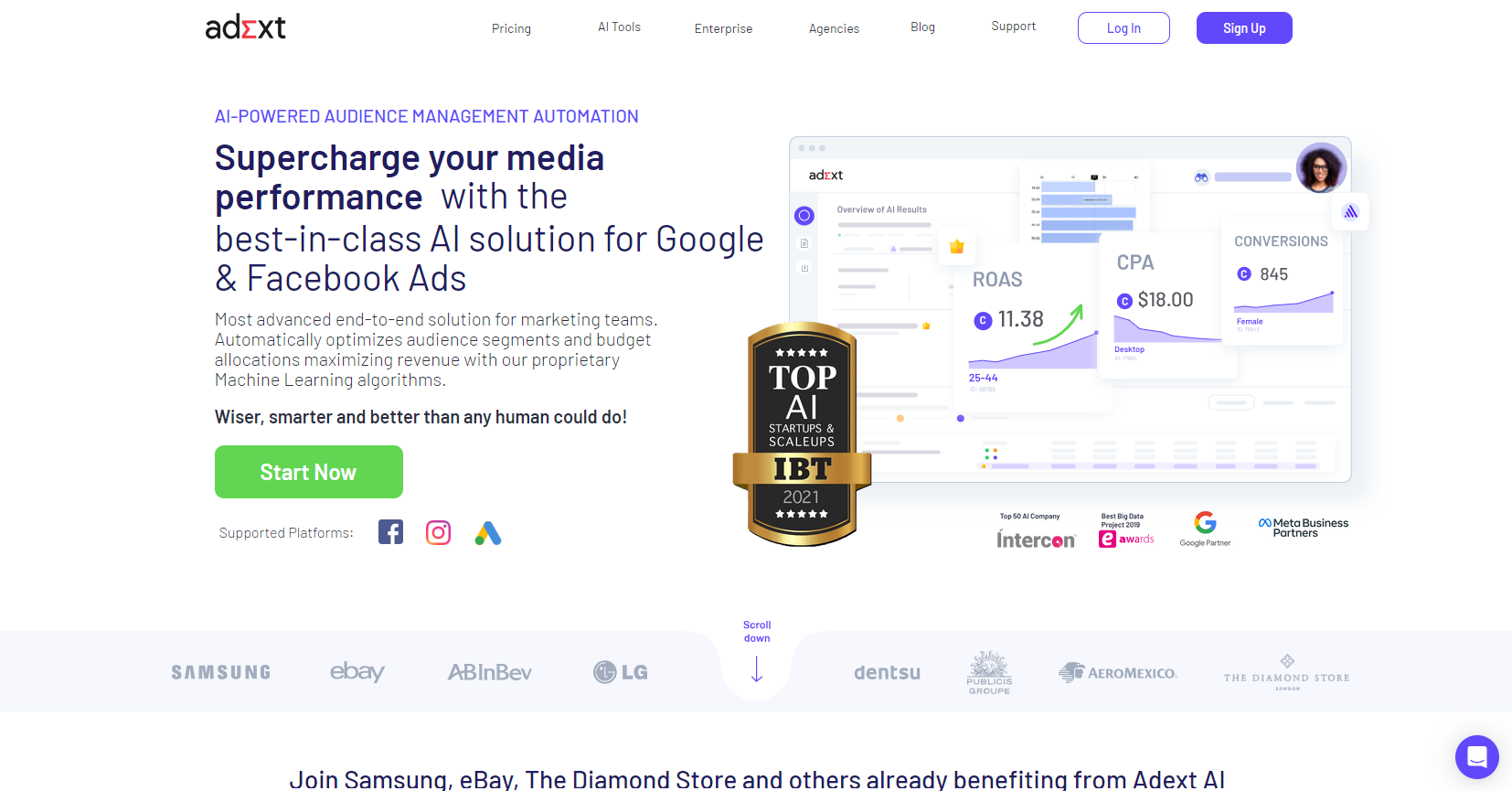
Adext AI is an AI-driven ad optimization tool that automates the management and scaling of digital ad campaigns across various platforms, optimizing for the best performance.
Advantages✅
- Automates campaign management.
- Cross-platform advertising capabilities.
- Budget optimization for cost-effective ads.
Disadvantages❌
- Can be expensive for smaller businesses.
- Requires monitoring to ensure campaign alignment.
- May not be suitable for highly niche markets.
15. BrightEdge
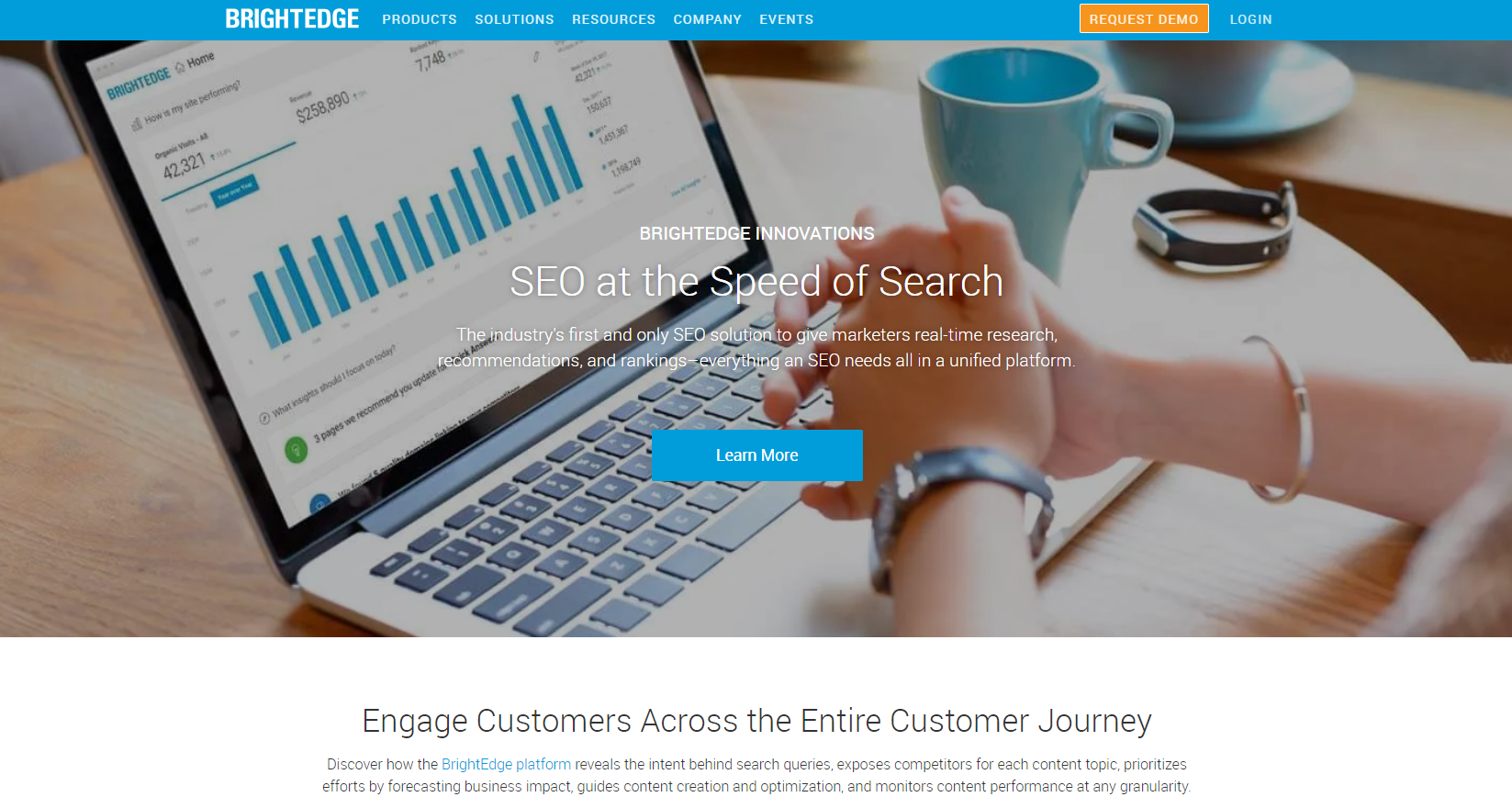
BrightEdge is an AI-powered SEO platform that helps marketers optimize their content for search engines, track performance, and gain insights into competitors.
Advantages✅
- Enhances content visibility through SEO.
- Provides keyword recommendations.
- Competitive analysis for better strategy planning.
Disadvantages❌
- High cost for small businesses.
- Requires SEO knowledge to fully utilize.
- Data overload can be overwhelming.
16. Jacquard

Jacquard, formerly Phrasee, is an AI-driven copywriting tool that optimizes marketing language, including email subject lines, social media ads, and other content, to improve engagement and conversions.
Advantages✅
- AI-generated language improves engagement.
- A/B testing for continuous improvement.
- Customizable to fit brand language.
Disadvantages❌
- Limited to text-based content.
- Can be expensive for small teams.
- Requires human oversight to ensure brand alignment.
17. Persado
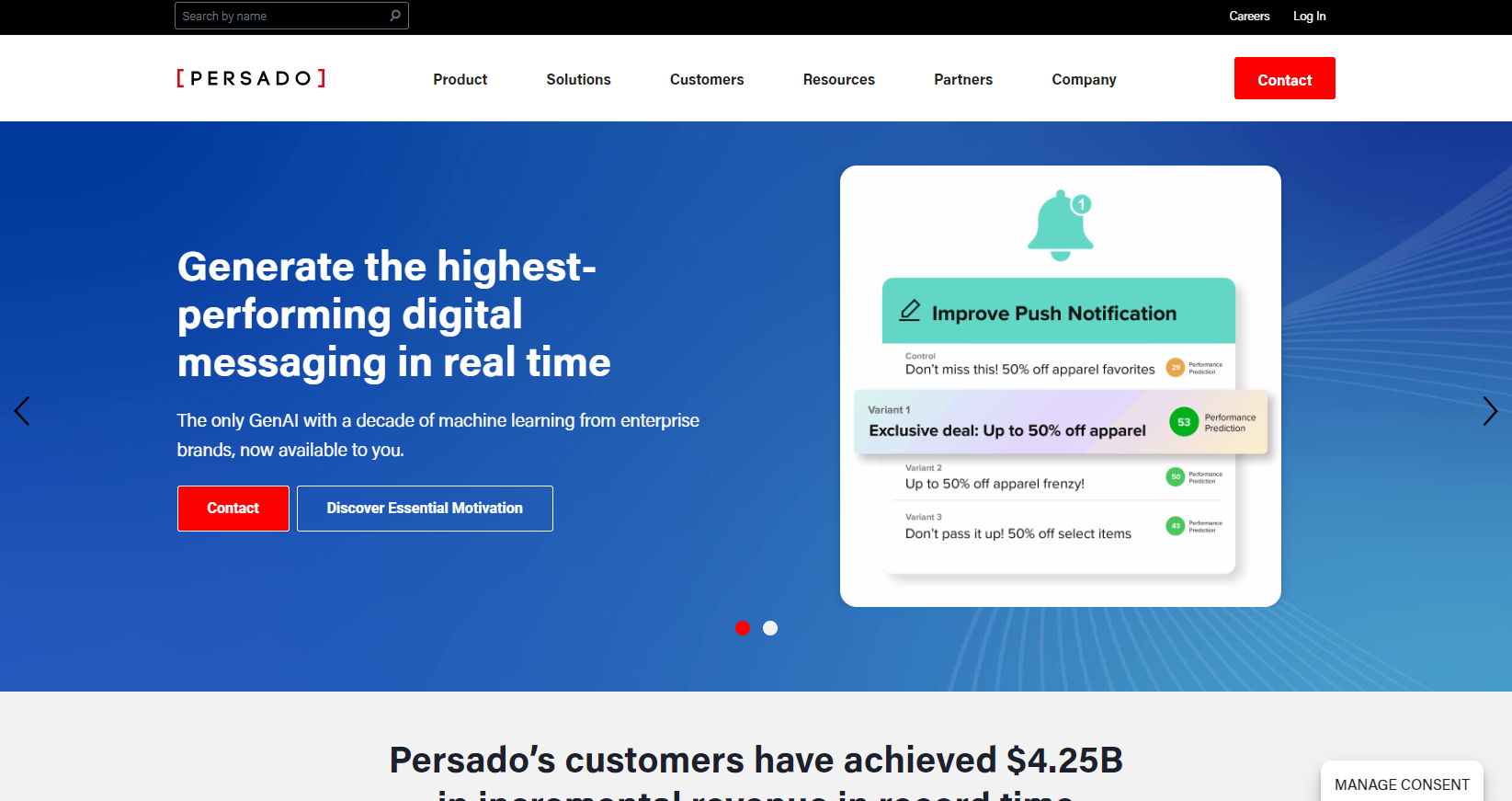
Persado is an AI-powered platform that generates marketing language designed to resonate emotionally with audiences, optimizing content for better engagement and conversions.
Advantages✅
- Emotionally targeted messaging improves response rates.
- Personalized content across multiple channels.
- AI-driven optimization for continuous improvement.
Disadvantages❌
- High cost, suitable for larger enterprises.
- Requires integration with existing marketing systems.
- May require human oversight for brand consistency.
18. FunnelAI
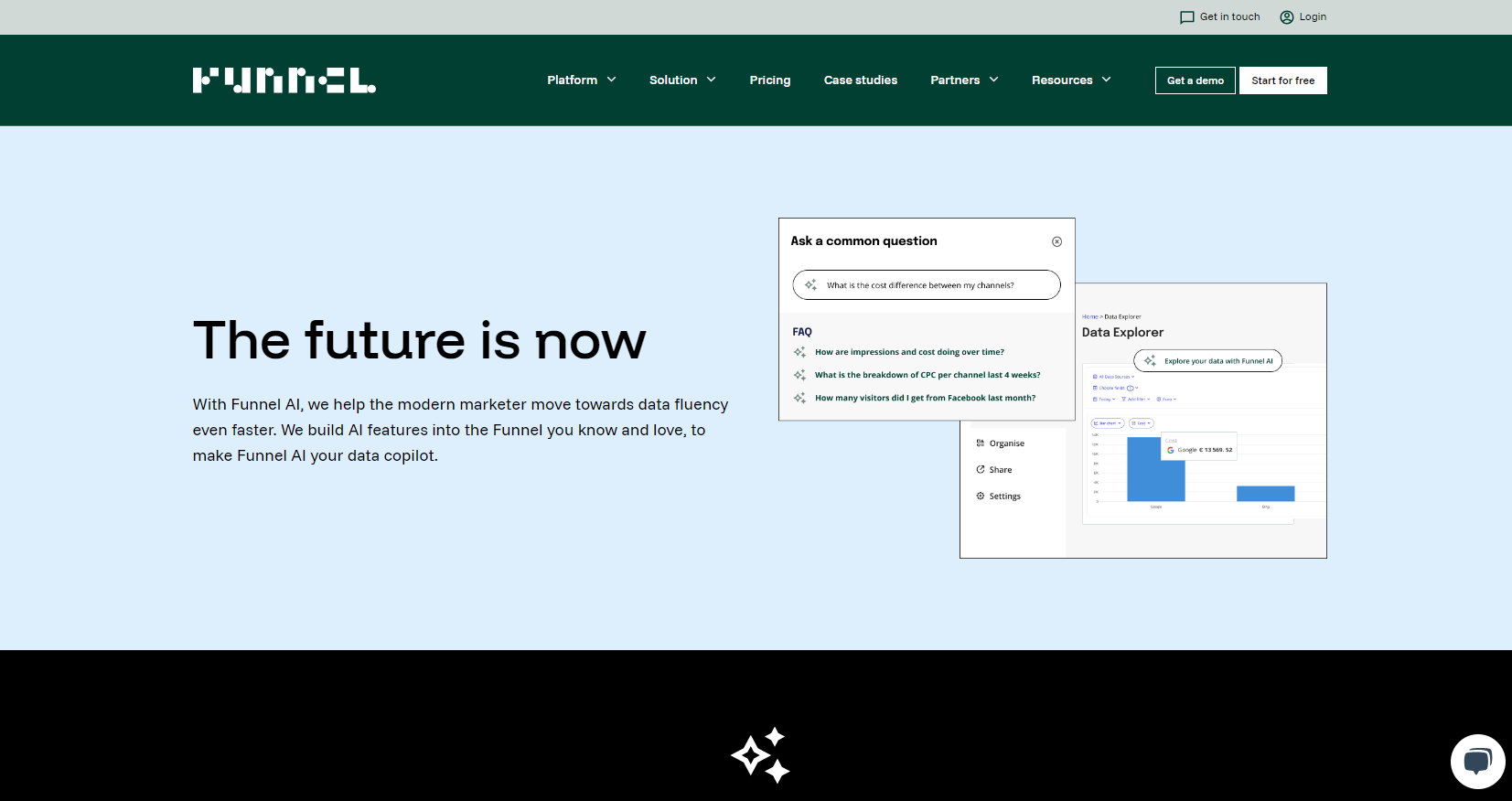
FunnelAI is an AI-driven customer engagement platform that helps brands identify and engage potential customers by analyzing intent data and providing predictive insights.
Advantages✅
- Identifies high-intent leads.
- Provides predictive analytics for better targeting.
- Enhances customer engagement with personalized content.
Disadvantages❌
- Expensive for small businesses.
- Requires integration with existing CRM systems.
- May need customization for industry-specific needs.
19. Albert.ai
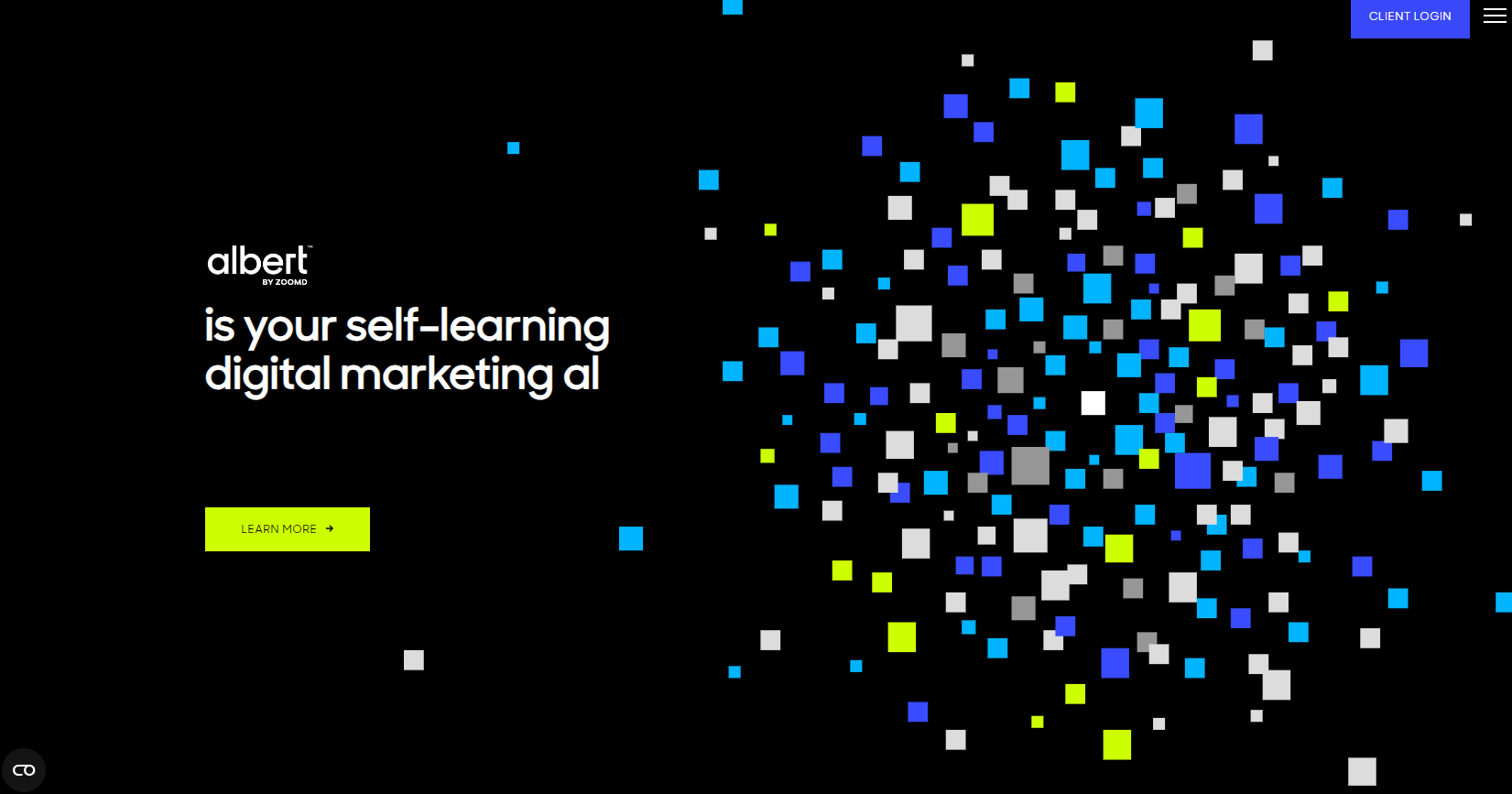
Albert.ai is an autonomous AI-driven platform that manages and optimizes digital marketing campaigns across various channels, focusing on maximizing ROI and audience reach.
Advantages✅
- Automates cross-channel campaign management.
- Audience segmentation for targeted marketing.
- Optimizes budget allocation for better ROI.
Disadvantages❌
- High cost, especially for small businesses.
- Requires monitoring to ensure alignment with business goals.
- Limited customization options.
20. Synthesia
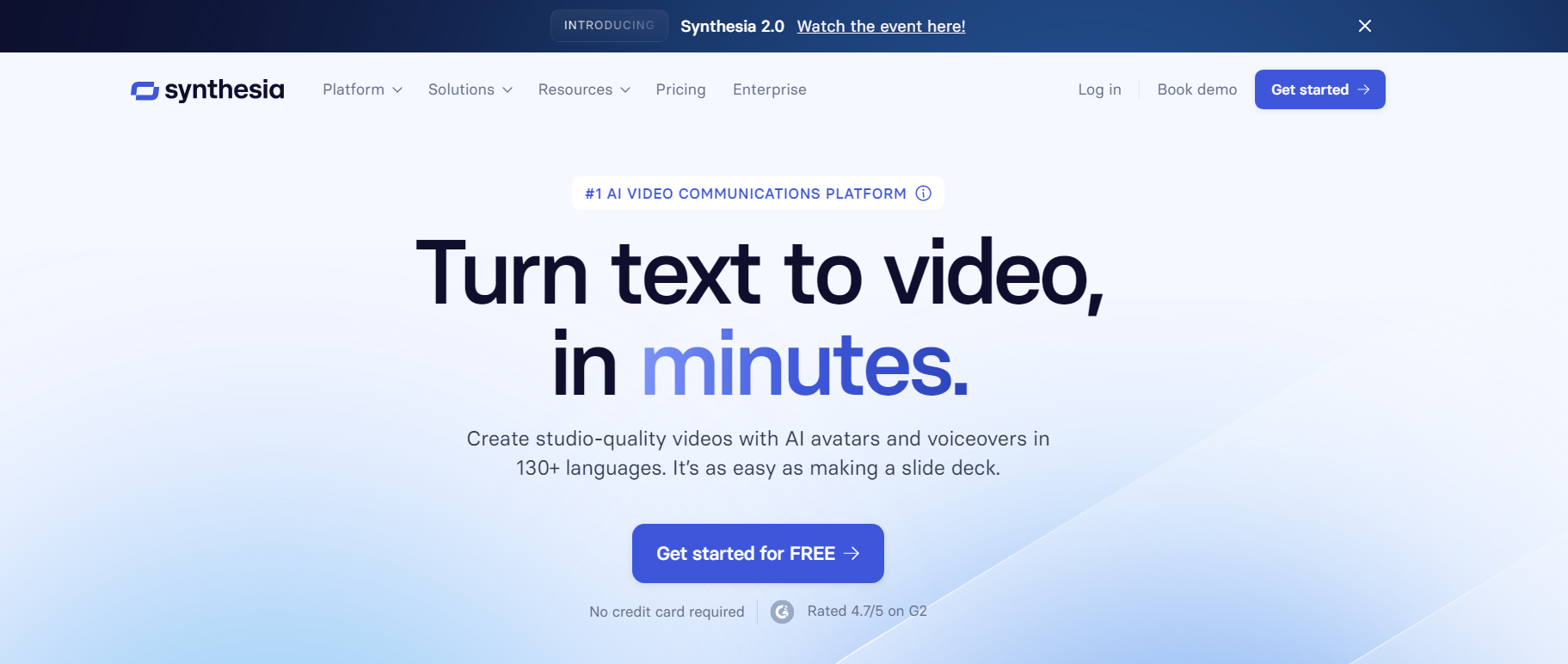
Synthesia is an AI-powered platform that enables the creation of personalized video content at scale, using custom avatars and multilingual support to engage diverse audiences.
Advantages✅
- Enables scalable video personalization.
- Custom avatars enhance brand consistency.
- Multilingual support broadens audience reach.
Disadvantages❌
- High cost for small teams.
- Limited to video content.
- Requires creative input for effective use.
21. VEED
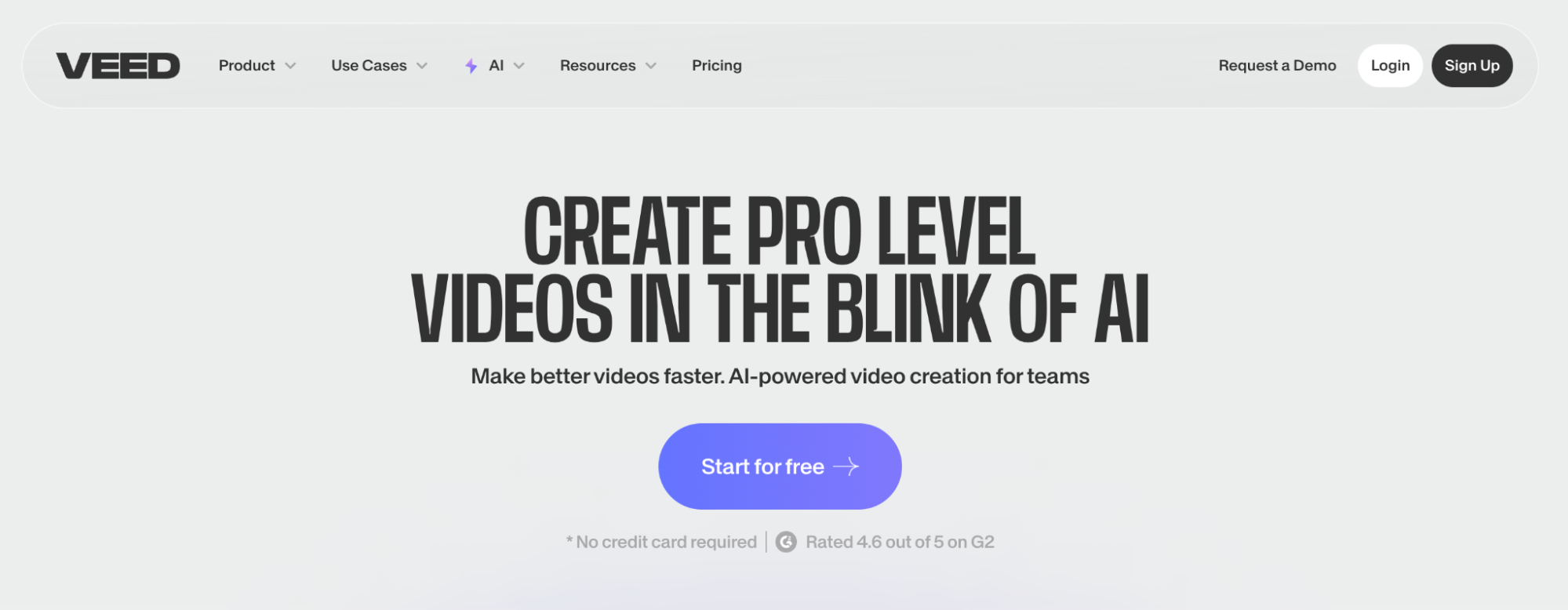
VEED packs a powerful suite of AI features for effortless video editing—all accessible directly from your browser.
Advantages✅
- Easy to use with a simple drag-and-drop editor.
- Multiple AI tools in one platform, including AI voice cloning, add music to video, and audio to text.
- Cloud-based and team-friendly.
Disadvantages ❌
- Free plan has watermarks and limits.
- Needs a stable internet connection.
- Best suited for simpler edits, not for highly advanced post-production tools.
A conversation intelligence software pinpoints subtleties in your customer interactions, yielding valuable insights for your marketing strategies.
How Is AI Used in Marketing?
Artificial Intelligence (AI) has transformed the marketing world by introducing automation, enhancing personalization, and delivering valuable insights. Here's a look at the primary uses of AI in marketing:
AI for Customer Personalization
AI's most impactful role in marketing is in customer personalization. It analyzes customer data to craft personalized content, offers, and experiences. This personalization extends to emails, social media posts, and product recommendations, adapting to each customer's preferences and behaviors.
AI for Content Creation
Content creation benefits greatly from AI, especially when using ChatGPT prompts or a software like Jasper.ai. This capability allows marketers to inject their unique style and ensure the content aligns with their brand's voice.
AI-driven content creation is a time-saver that also aids in generating new content ideas and refining existing materials.

AI for Data Analysis and Predictive Analytics
AI shines in its ability to swiftly and accurately analyze extensive datasets, offering marketers insights into customer behavior and market trends. Predictive analytics, powered by machine learning, forecast future trends, enabling marketers to better predict customer needs and tailor their strategies.
AI for Marketing Automation
In marketing automation, AI is indispensable. It takes over repetitive tasks like email marketing, social media scheduling, and ad placements. Tools like AdRoll and Hootsuite apply AI to enhance marketing campaigns across channels, ensuring messages are timely and targeted.
AI for Customer Support and Engagement
For customer support and engagement, AI-powered chatbots and virtual assistants are increasingly common. They manage inquiries, offer instant responses, and aid in lead nurturing, with tools like Otter.ai enhancing meeting productivity through real-time transcription and note-taking.
AI for Ad Optimization and Campaign Management
AI optimizes digital advertising, including PPC campaigns. Some solutions autonomously create and refine campaigns across marketing channels, improving performance and efficiency.
In summary, AI in marketing boosts efficiency, personalization, and strategic decision-making, allowing marketers to concentrate on creative and strategic endeavors while automating the mundane.
What is the Future of AI and Marketing?
The future of marketing with AI is set to be transformative, dynamic, and highly personalized. The following key trends and developments are poised to shape the marketing landscape in the years ahead:
Hyper-Personalization and Customer Engagement
Hyper-personalization stands out as a significant trend in the future of AI marketing. AI's capabilities will enable unparalleled levels of personalization, allowing brands to craft content that closely aligns with individual customer preferences and behaviors. This approach will enhance customer experiences, making them more seamless and intuitive.
Real-Time Insights and Decision-Making
AI's provision of real-time insights will empower marketers to make swift, informed decisions. This capability will enable marketing teams to adapt strategies in real time, fine-tuning campaigns to better connect with their target audience or shifting focus to more promising channels.
This agility is vital for staying relevant and competitive in today's fast-evolving market.
Content Creation and Curation
AI will be instrumental in content creation and curation. For example, generative AI will be utilized for producing written content and creative visuals, reducing the time spent on basic tasks and enabling marketers to concentrate on strategic initiatives.
This advancement will aid in generating fresh content ideas and refining existing content to better align with brand tones and customer preferences.
Ethical Considerations and Brand Trust
As AI becomes more embedded in marketing strategies, ethical considerations will gain prominence. It's important for marketers to ensure that AI-driven campaigns are respectful of data privacy and ethical standards.
Establishing trust with consumers is paramount, as transparency and accountability in AI-driven marketing are essential for upholding brand integrity.
The Evolving Role of Marketers
With AI taking over routine and repetitive tasks, the role of marketers will significantly evolve. The focus will shift more towards creative and strategic tasks that require human insight, such as planning, crafting creative messages, and understanding consumer behavior. Marketers will need to stay abreast of the latest trends, technologies, and best practices in AI to adapt to this shift.
Challenges and Opportunities Ahead
Although AI presents numerous opportunities for marketing innovation, it also brings challenges. Marketers will have to manage the complexities of AI implementation, address ethical concerns, and ensure that AI systems are transparent and explainable. Collaboration and continuous learning will be essential for overcoming these challenges and leveraging the full potential of AI in marketing.
In conclusion, the future of marketing with AI holds great promise, with advancements in personalization, real-time insights, and content creation poised to revolutionize how marketers engage with their audiences. As AI technology continues to advance, it will be essential for marketers to adapt and innovate, ensuring that their strategies are in line with the latest technological and ethical standards.
Pros and Cons of Using AI for Marketing
The integration of AI in marketing offers numerous benefits that can significantly enhance marketing efforts.
Pros of AI Marketing
1. Increased Efficiency
AI excels at automating repetitive tasks, such as cold email campaigns, lead scoring, and social media scheduling. This automation frees up marketers to focus on more strategic and creative tasks, improving overall efficiency and reducing the workload.
2. Clear Data Insights
AI tools are adept at processing vast amounts of data, providing clear and actionable insights that help marketers understand customer behavior, preferences, and market trends. This data analysis enables marketers to make informed decisions and optimize their campaigns for better results.
3. Hyper-Personalization
AI allows for hyper-personalization by analyzing customer data to create highly tailored experiences. This includes personalized product recommendations, customized messaging, and content that resonates deeply with individual customers, enhancing their overall experience.
4. Streamlined Marketing Efforts
AI streamlines marketing efforts by optimizing campaigns in real-time, ensuring that every marketing dollar is maximized for impact. Predictive analytics also help marketers anticipate future trends and customer behavior, allowing for proactive strategies rather than reactive ones.
5. Cost-Effectiveness
While the initial investment in AI technology can be significant, it often proves cost-effective in the long run. AI tools can handle tasks that would otherwise require multiple employees, reducing labor costs and improving ROI.
Despite the numerous benefits, there are also several challenges and limitations associated with using AI in marketing.
Cons of AI Marketing
1. Dependence on Data Quality
AI algorithms require high-quality and extensive datasets to function effectively. Poor data quality can lead to inaccurate predictions and analyses, which can negatively impact marketing campaigns.
2. Lack of Human Touch
AI systems, including chatbots, lack the human touch and empathy that customers often prefer. While AI can handle routine inquiries, complex issues may require human intervention, which can lead to customer frustration if not managed properly.
3. Necessary Human Intervention
AI tools are not self-evolved and require human intervention for setup, training, and ongoing management. This means that marketers may need to hire or train staff with the necessary skills to implement and maintain AI systems effectively.
4. Over-Reliance on AI
Leaning too heavily on AI can lead to over-reliance, which can result in missed opportunities for human creativity and innovation. AI should be seen as a tool to augment human capabilities, not replace them entirely.
5. Potential for Errors and Bias
AI predictions and analyses can sometimes be wrong, and AI systems can reflect biases present in the training data. These issues can lead to suboptimal marketing strategies and potential harm to the brand.
Conclusion
The integration of Artificial Intelligence (AI) into marketing has fundamentally changed how companies interact with their audience, refine their marketing strategies, and analyze performance data. It's essential to recognize the value of utilizing AI for creating highly personalized experiences, gaining instant insights, and implementing automation processes.
If you're ready to deploy AI in your marketing strategy, start your free trial of Empower today!
AI Marketing FAQ
What are the different types of AI in marketing?
Marketing leverages various AI technologies, each offering distinct capabilities and benefits. The primary types include:
- Machine Learning (ML): A branch of AI that allows computers to learn from data autonomously. ML is instrumental in predicting customer behavior, optimizing pricing, and enhancing lead targeting.
- Natural Language Processing (NLP): This technology enables machines to comprehend, interpret, and produce human language. Applications include chatbots, sentiment analysis, and automated content creation.
- Generative AI: Capable of generating new content such as text, images, and music. It's widely used for creating advertising copy, social media posts, and other creative outputs.
- Conversational AI: Encompasses chatbots and virtual assistants designed to interact with customers in real-time, facilitating product and service navigation.
- Predictive Analytics: This AI-powered tool predicts future trends and customer behaviors by analyzing historical data, enabling marketers to stay ahead of market trends.
What is the best example of AI in marketing?
Netflix and Amazon stand out as prime examples of AI-driven marketing, particularly through their use of personalization tools. These platforms employ sophisticated AI algorithms to sift through customer data, delivering highly personalized content recommendations.
Netflix tailors its show and movie recommendations based on individual viewing histories, whereas Amazon utilizes predictive analytics to suggest products aligned with a user's browsing and purchasing patterns. These practices underscore the power of AI in fostering customer engagement and propelling business growth via hyper-personalization.
Published on September 5, 2024.
